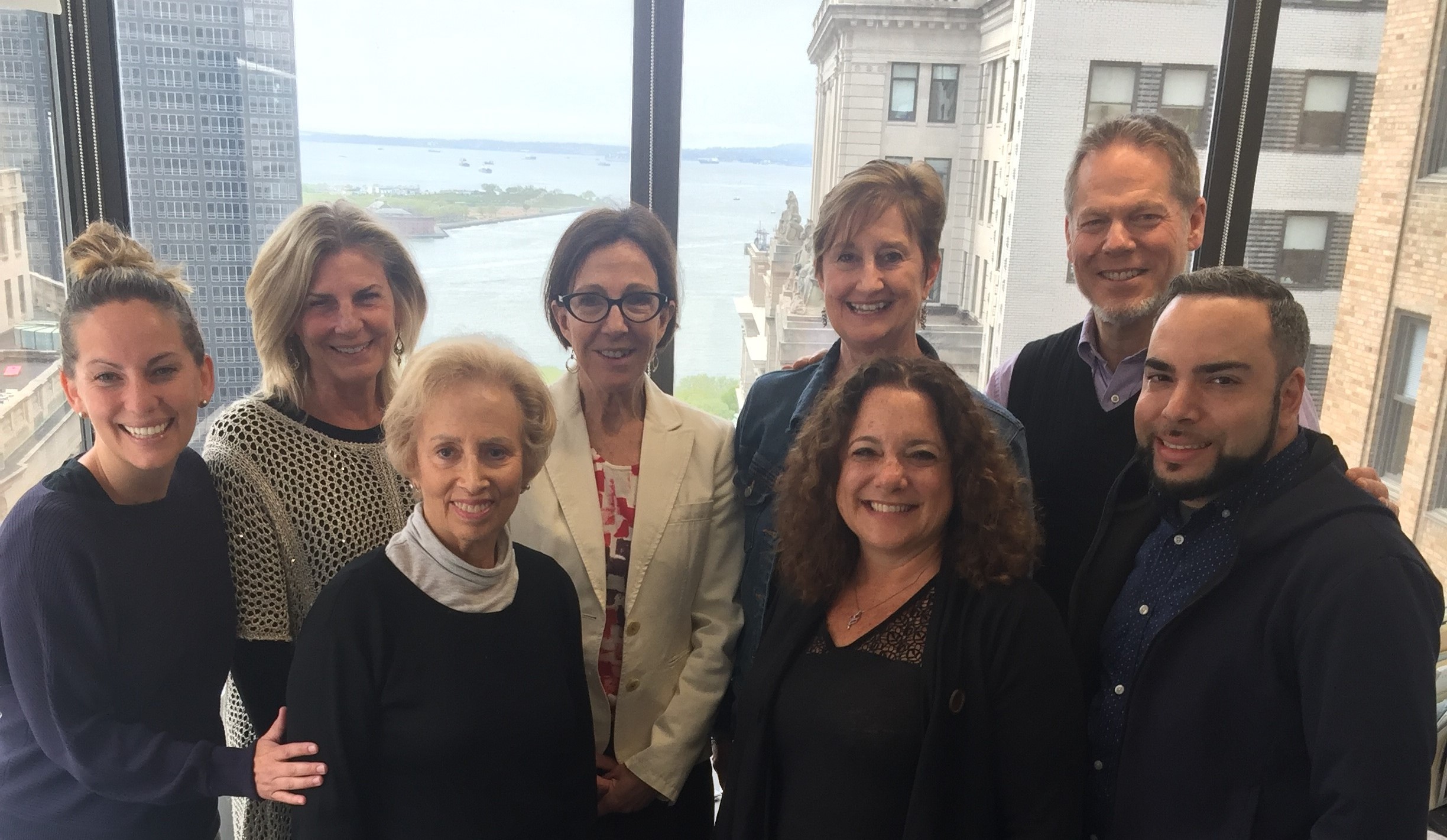Welcome to our Changemaker Profiles blog series! Each edition will profile one outstanding social changemaker from the JVA client community. By sharing the stories of some of the incredible people we get to work with every day, each accomplishing extraordinary work in nonprofits, government, social enterprise and elsewhere, we hope we will bring a little light and inspiration to your day!
This week, we spoke with Emily Merritt (far left in photo), the director of intergenerational initiatives for the nonprofit Alliance for Strong Families and Communities. The Alliance is a national organization that “works as a strategic action network in partnership with other nonprofits across the country, helping them develop capacity and increase influence as changemakers in their own community,” Emily explains. Her specific focus is Second Acts for Strong Communities, an intergenerational initiative uniting a cohort of 10 organizations and the member network around best practices and new approaches for engaging and leveraging older adult talent.
1. Tell us about you and your organization and the social change you are trying to achieve.
“(The Alliance) offers networking, training, a team of librarians, a policy team and more. We also do cohort work, where groups of members come together on a particular theme and test new models and identify best practices and innovative models to help build capacity. One of those is Second Acts for Strong Communities, which I oversee. We harness the time, talent and expertise of people 50 and over as influencers and their positive impact in their communities. It is helping the nonprofit sector to better recruit and integrate the 50-plus talent pool, including paid and unpaid roles. There are no limits to the way we think about using this talent pool; it’s up to the organization.”
2. What keeps you inspired and going when things get tough?
“The first thing is all the great people we work with—all the staff we work with daily at different organizations, the older adults and fellows that they’re recruiting, also the team at JVA. Interesting, smart, committed people are always sort of the reason I am inspired and personally committed to the work.
“I think too I have personal passions for this kind of narrative shift. People are so used to hearing about older adults as frail, isolated and in need of services—but there is another story about aging that I think we need to do better about telling. Particularly in the second half of our lives, we all have something to give, we all want to be connected.”
“We have a bigger mission of telling that story, not only on an individual basis but for our communities. And the longer I do this work, I realize it’s not just about older adults, it’s really about all of us, regardless of age, having a place to be contributing and having a purpose.”
3. What advice would you give to someone who is trying to break new ground in a traditional field?
“Through this work, what keeps coming up is the value and importance of starting small. For example, within the cohorts, each of the organizations have different missions, different communities. They’re unique and they’re trying different approaches. So starting small, testing something specific, doing something new. There’s a value in reflecting on what worked, what didn’t, and using those missteps as the opportunities to refine and try again—building upon what you learn, before trying to replicate it and scale it.
“One other piece I would add is to build buy-in, bring on champions when you’re doing something new and different. When you do something and it works, use that success story to rally support around future efforts. People want to be a part of a success.”
4. What book do you recommend to everyone you meet and why?
“I don’t know that this is a life-changing book, but my husband and I got married a couple of months ago and we spent our honeymoon in Tanzania. I did a lot of reading there, including ‘The Boys in the Boat,’ by Daniel James Brown. It’s about a Seattle-based rowing team in the 1930s. It’s an incredible story about the power of mentoring, coaches, teamwork and also individual commitment to something and how all of those pieces need to come together. So it’s related to the work we’re doing in communities: You need older, more experienced voices to guide you, individuals to push you, but also a team. It’s a really inspiring book that shared common themes with the work we do.”
5. How have you worked with JVA, and how has that helped your organization?
“It’s been an absolute pleasure working with such a smart, organized, thoughtful team. We brought them in right at the launch of Second Acts to conduct evaluation. They have provided training and tech support, executing surveys and interviews of all the different stakeholders.
“The initiative has three levels of impact: the individual level—the experiences of older adults and youth, the individual staff voices of people working with the older adults and whether they are they seeing change; the organizational level—whether the organization is better able to meet its mission; and then community- or Alliance network-wide—can these models provide a helpful solution to challenges we have as a sector. JVA is guiding us through those various levels. They are also a great sounding board. We have almost completed all of the site visits we planned for halfway through the initiative. Having JVA there, just to provide feedback and guidance to me at the sites, has been invaluable.”
JVA is excited to help Emily continue to help people overcome barriers to achieving their full potential through Second Acts for Strong Communities and the Alliance for Strong Families and Communities. Check out the Alliance website for evidence of the organization’s and the initiative’s incredible nationwide impact.
And if you want to keep up with the area’s most inspiring changemakers, read JVA’s Changemakers blog!







Leave A Comment